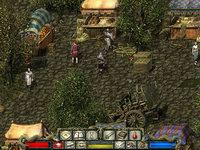| |
Site Navigation
Main
News
Forums
Games
Games Database
Top 100
Release List
Support Files
Features
Reviews
Previews
Interviews
Editorials
Diaries
Misc
Download
Gallery
Music
Screenshots
Videos
Miscellaneous
Staff Members
Privacy Statement
|
|
Isaac Gartner, CEO of Click Entertainment, was interviewed by Gamehelper. The interview seems to have been conducted after the demo came out, but it's interesting nevertheless:
GH: Using four characters in tandem was daunting to say the least. The AI of the characters not in use has some personality to it. I had trouble keeping the large behemoth of a man from charging down the corridor every time he saw an enemy. Was it difficult to implement AI for the characters and the enemies?
Click: It was definitely challenging because we wanted to create a whole new system for controlling multiple characters, and there was no guarantee that it would end up being fun. Also, while we were developing the engine, the AI development kept getting pushed back. The upside is that by the time we did get around to doing it, we had had some time to think about what the AI should do. The basic principles were simple: make sure the AI characters donít do brain-dead things, and make sure they arenít so good that the player doesnít need to do anything. For example, we wanted to avoid having the Samurai standing around getting attacked without fighting back, or dying because they didnít think to drink a potion, or using up all of their Ki (Japanese equivalent of Mana) in five seconds. Just making non-brain-dead characters makes you better than, say 90% of games out there. Beyond that, AI design in my experience has been largely a matter of trial and error. You try something, then people play and say ďI wish it did blah.Ē Enough people request blah and you realize that would probably help make the game better. I guess that describes the general process of iterative design, not just AI design. |
|
|





 Throne of Darkness Interview with Isaac Gartner
Throne of Darkness Interview with Isaac Gartner